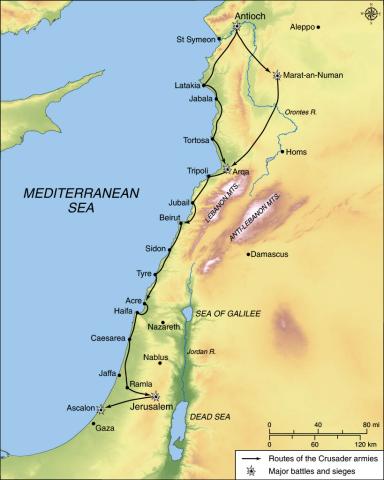The Battle of Ascalon
[10.39.3] Intereā nūntius vēnit Tancredō et comitī Eustachīō, ut praeparārent sē et pergerent ad recipiendam Neopolitānam urbem. Exiērunt illī et dūxērunt sēcum multōs mīlitēs et pedōnēs, et pervēnērunt ad urbem. Habitātōrēs vērō illīus reddidērunt sē īlicō.
Dēnuō mandāvit illīs dux, ut cito venīrent ad bellum quod nōbīs ammiralius Babylōniae praeparat urbī Ascalonae. Illī autem festīnandō intrāvērunt montaneam quaerentēs Saracēnōrum bella, et vēnērunt Caesaream. Itaque venientēs illī iuxtā mare ad urbem Ramole, illīc invēnērunt multōs Ārabēs, quī praecursōrēs erant bellī. Quōs nostrī persequentēs, apprehendērunt plūrēs ex eīs, quī dīxērunt omnia bellī nova, ubi essent et quot essēnt, aut ubi bellāre dispōnerent contrā Chrīstiānōs.
notes
(July–August 1099) Tancred and Eustace of Boulogne accept the surrender of Nablus. When Godfrey of Boulogne hears that a Fatimid army from Cairo is marching on Ascalon, Tancred and Eustace lead a scouting expedition. After a skirmish they take prisoners to learn more about the new enemy.
comitī Eustachīō: Eustace of Boulogne, brother of duke Godfrey, mentioned first at 10.38.2.
Neopolitānam urbem: modern Nablus (on the West Bank).
ammiralius Babylōniae: the emir of Cairo; his army was led by al-Afdal.
Caesaream: Caesarea Maritima.
Ramole: Ramla.
quī praecursōrēs erant bellī: = quī praecurōrēs erant exercitūs.
quī dīxērunt omnia bellī nova: “who told (them) all the news of the war.”
vocabulary
pedō –ōnis, m.: foot-soldier, infantryman (ML)
denuō: once more, again, a second time
cito: quickly
montanea, ae, f.: mountain, hill (ML, and rare)
praecursor –ōris, m.: a forerunner, scout

